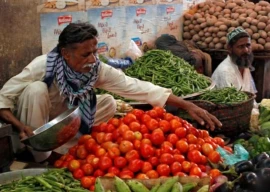
Relatives of missing persons and activists demanding an end to enforced disappearances continued their sit-in at D Chowk for the third consecutive day on Wednesday.
On an exceptionally hot day in April in the capital, around 50 demonstrators sat under a tent.
Led by Amina Masood Janjua, the founder of an organisation, Defence of Human Rights, the demonstrators carried framed pictures of their loved one allegedly abducted by state agencies and shouted slogans for their release.
Janjua, who became an activist for missing persons since her husband was abducted in 2005, was among 12 demonstrators who were beaten, mishandled and detained by the police on Monday. Many more protesters and some police officials were also injured in the ensuing scuffles between police and protesters and by tear-gas shelling. Janjua was released from police custody four hours later on the same day after Prime Minister Nawaz Sharif intervened. She returned to the missing persons’ camp on Jinnah Avenue after her release.
Kohsar police, nevertheless, registered a case against the 12 people detained and later released, on Tuesday. The police have not confronted the demonstrators again since the row on Monday which resulted in the suspension of two ASPs. The number of police officials at D Chowk in the high-security Red Zone, has also been drastically reduced.
On Wednesday, the demonstrators wore white bandages on their foreheads and wrists with red marks painted on the bandages to symbolise their protest against police brutality. Their camp, set up smack in the middle of D Chowk, also signified a shift in the nature of the protest. The demonstrators had set up a temporary camp on a green belt on Jinnah Avenue on Monday afternoon and did not disrupt traffic flow.
After action against them, which police alleged was instigated by some demonstrators trying to move towards the Parliament House, the demonstrators occupied D Chowk and have remained there since Monday evening where they plan to stay.
“We’re going to continue the sit-in till the prime minister returns from his foreign trip,” Janjua told The Express Tribune. “We’ve pinned our hopes on him because he responded with kindness after the police beat us up on Monday.” She said the interior minister has set up an inquiry committee but no one from the Islamabad Capital Territory administration has contacted her to record her statement. Prime Minister Sharif is currently on a five-day visit to the United Kingdom.
Rights activist Farzana Bari, who showed up at the missing persons’ camp to express solidarity, said police brutality against the missing persons’ activists was shameful and condemnable because the right to peaceful assembly is a constitutional right. “Enforced disappearances have to be condemned unconditionally. There is no law on Earth that can justify enforced disappearances.”
Among the demonstrators, Faiza Naseem from Khanewal said her son Rizwan Yousaf has been missing since 2004. She said she was told her son had died and when she went to court, the case was dismissed on an official’s verbal testimony without evidence of her son’s death.
“What is my crime? If my son is a criminal, I ask the authorities to produce him in court and give him a fair trial. It has been 10 years,” Naseem said. “There is no justice in Pakistan.”
Relatives of missing persons have filed individual cases with the Supreme Court. In 2013, lawyers representing the ministry of defence for the first time told the apex court that some missing persons had been traced in internment centres, while others had returned home. The court was provided a list of 750 missing persons in internment centres around the country.
Published in The Express Tribune, May 1st, 2014.
1732503274-0/Untitled-design-(43)1732503274-0-405x300.webp)
1732501636-0/Untitled-design-(42)1732501636-0-165x106.webp)

1732498967-0/Outer-Banks--(1)1732498967-0-165x106.webp)
1732086766-0/BeFunky-collage-(74)1732086766-0-165x106.webp)












COMMENTS
Comments are moderated and generally will be posted if they are on-topic and not abusive.
For more information, please see our Comments FAQ